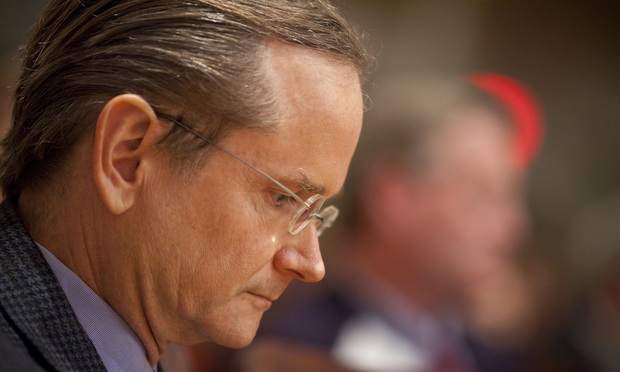Harvard Law Professor Sues New York Times for 'Clickbait Defamation' Over Jeffrey Epstein
Harvard Law School professor Lawrence Lessig claimed the New York Times defamed him for clicks.
January 13, 2020 at 05:01 PM
4 minute read
 Harvard law professor Lawrence Lessig. (Photo: Justin Ide/Harvard University News Office)
Harvard law professor Lawrence Lessig. (Photo: Justin Ide/Harvard University News Office)
Harvard Law School professor Lawrence Lessig lawyered up Monday to sue the New York Times in the U.S. District Court for the District of Massachusetts over a article he claims defamed him for clicks.
Lessig claimed the newspaper used "clickbait" and incorrectly linked him with "perhaps the most horrific and widely publicized pedophile scandal in American history."
Vice president of communications for the Times, Danielle Rhoades Ha, stood by the report.
"When Professor Lessig contacted The Times to complain about the story, senior editors reviewed his complaint and were satisfied that the story accurately reflected his statements," Rhoades Ha said in an emailed statement. "We plan to defend against the claim vigorously."
The report ran Sept. 14, 2019, with a lede and headline that said Lessig was defending the acceptance of clandestine donations from convicted sex offender Jeffrey Epstein to educational institutions, including the Massachusetts Institute of Technology. Epstein, a disgraced West Palm Beach, Florida, financier, died by apparent suicide in 2019 while awaiting trial in a New York jail on sex trafficking charges.
"It is hard to defend soliciting donations from the convicted sex offender Jeffrey Epstein. But Lawrence Lessig, a Harvard Law professor, has been trying," the opening sentence read.
That was false, according to Lessig's lawsuit, which said the article had a radioactive effect, prompting "mass outrage" from universities, social media followers and sexual assault victims. The complaint claims "Lessig became associated with the notoriety surrounding the Epstein scandal, and the community that quietly or silently tolerated such monstrosity."
The lawsuit alleged the article was an example of clickbaiting, where a writer uses a shocking but misleading headline to draw in readers. The plaintiff argued that a few lines of text can do a lot of harm when published by a media outlet with about 150 million global readers.
"Defendants are fully aware that many, if not most, readers never read past the clickbait, and that their takeaway concerning the target of the headline is limited to what they read in the headline," the complaint said.
The Times report stemmed from an essay Lessig had written for the online platform Medium in which he had reasoned that institutions should avoid accepting money from scorned figures and criminals such as Epstein but that, if they did, the donor should be anonymous.
"I thank god that I've never been obligated to raise money for an institution like MIT," Lessig's essay read. "Because I know that in every moment of that existence, I would be forced to confront a gap between what I believe is right and what every institution does. And yet, as a person charged with fundraising, I would be pressed to adopt the ethics of the institution, not the ethics of myself."
Now, Lessig has published a new blog post in tandem with the lawsuit.
"My essay said—repeatedly—that such soliciting was a 'mistake,'" he wrote in Monday's post. "And more importantly, it was a mistake because of the kind of harm it would trigger in both victims and women generally."
He has retained Howard Cooper and Tara Dunn of Todd & Weld in Boston to handle the case.
Read the full complaint:
Read more:
Repairing Reputation Regardless of Cost: Why Companies Pursue Hackers
Attorney Sues Attorney for Defamation After Sex Harassment Scandal in State Government
This content has been archived. It is available through our partners, LexisNexis® and Bloomberg Law.
To view this content, please continue to their sites.
Not a Lexis Subscriber?
Subscribe Now
Not a Bloomberg Law Subscriber?
Subscribe Now
NOT FOR REPRINT
© 2025 ALM Global, LLC, All Rights Reserved. Request academic re-use from www.copyright.com. All other uses, submit a request to [email protected]. For more information visit Asset & Logo Licensing.
You Might Like
View All
The Week in Data Jan. 24: A Look at Legal Industry Trends by the Numbers


University of Chicago Accused of Evicting Student for Attending Gaza-Israel Protest
3 minute read
Sanctioned Penn Law Professor Amy Wax Sues University, Alleging Discrimination
5 minute readTrending Stories
- 1We the People?
- 2New York-Based Skadden Team Joins White & Case Group in Mexico City for Citigroup Demerger
- 3No Two Wildfires Alike: Lawyers Take Different Legal Strategies in California
- 4Poop-Themed Dog Toy OK as Parody, but Still Tarnished Jack Daniel’s Brand, Court Says
- 5Meet the New President of NY's Association of Trial Court Jurists
Who Got The Work
J. Brugh Lower of Gibbons has entered an appearance for industrial equipment supplier Devco Corporation in a pending trademark infringement lawsuit. The suit, accusing the defendant of selling knock-off Graco products, was filed Dec. 18 in New Jersey District Court by Rivkin Radler on behalf of Graco Inc. and Graco Minnesota. The case, assigned to U.S. District Judge Zahid N. Quraishi, is 3:24-cv-11294, Graco Inc. et al v. Devco Corporation.
Who Got The Work
Rebecca Maller-Stein and Kent A. Yalowitz of Arnold & Porter Kaye Scholer have entered their appearances for Hanaco Venture Capital and its executives, Lior Prosor and David Frankel, in a pending securities lawsuit. The action, filed on Dec. 24 in New York Southern District Court by Zell, Aron & Co. on behalf of Goldeneye Advisors, accuses the defendants of negligently and fraudulently managing the plaintiff's $1 million investment. The case, assigned to U.S. District Judge Vernon S. Broderick, is 1:24-cv-09918, Goldeneye Advisors, LLC v. Hanaco Venture Capital, Ltd. et al.
Who Got The Work
Attorneys from A&O Shearman has stepped in as defense counsel for Toronto-Dominion Bank and other defendants in a pending securities class action. The suit, filed Dec. 11 in New York Southern District Court by Bleichmar Fonti & Auld, accuses the defendants of concealing the bank's 'pervasive' deficiencies in regards to its compliance with the Bank Secrecy Act and the quality of its anti-money laundering controls. The case, assigned to U.S. District Judge Arun Subramanian, is 1:24-cv-09445, Gonzalez v. The Toronto-Dominion Bank et al.
Who Got The Work
Crown Castle International, a Pennsylvania company providing shared communications infrastructure, has turned to Luke D. Wolf of Gordon Rees Scully Mansukhani to fend off a pending breach-of-contract lawsuit. The court action, filed Nov. 25 in Michigan Eastern District Court by Hooper Hathaway PC on behalf of The Town Residences LLC, accuses Crown Castle of failing to transfer approximately $30,000 in utility payments from T-Mobile in breach of a roof-top lease and assignment agreement. The case, assigned to U.S. District Judge Susan K. Declercq, is 2:24-cv-13131, The Town Residences LLC v. T-Mobile US, Inc. et al.
Who Got The Work
Wilfred P. Coronato and Daniel M. Schwartz of McCarter & English have stepped in as defense counsel to Electrolux Home Products Inc. in a pending product liability lawsuit. The court action, filed Nov. 26 in New York Eastern District Court by Poulos Lopiccolo PC and Nagel Rice LLP on behalf of David Stern, alleges that the defendant's refrigerators’ drawers and shelving repeatedly break and fall apart within months after purchase. The case, assigned to U.S. District Judge Joan M. Azrack, is 2:24-cv-08204, Stern v. Electrolux Home Products, Inc.
Featured Firms
Law Offices of Gary Martin Hays & Associates, P.C.
(470) 294-1674
Law Offices of Mark E. Salomone
(857) 444-6468
Smith & Hassler
(713) 739-1250








